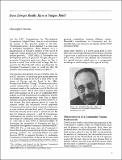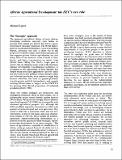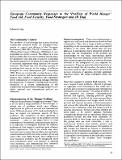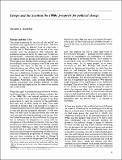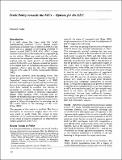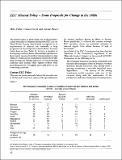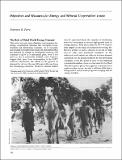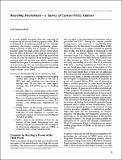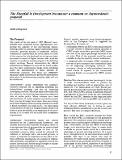Volume 14, Issue 3: Europe and the South in the 1980s
Browse by
Recent Submissions
-
Does Europe Really Have a Unique Role?
(Institute of Development Studies, 01/07/1983)SUMMARY The EEC Commission claims that a common development policy is good for Europe. But is it good for the Third World? Are there any intrinsic features of the EEC that invest it with the potential to achieve more on ... -
African Agricultural Development: the EEC's new role
(Institute of Development Studies, 01/07/1983)SUMMARY Since 1970, food output per person in sub?Saharan Africa has fallen by 10?25 per cent. By 1979, aid comprised 54 per cent of the region's investment, and 40 per cent of its imports. Yet aid has done little to ... -
European Community Responses to the ‘Problem of World Hunger’: Food Aid, Food Security, Food Strategies and All That
(Institute of Development Studies, 01/07/1983)SUMMARY The problem of ‘world hunger’ as it is conventionally understood in fact involves a number of related problems. A weakness of the North's response is its failure to recognise interrelationships between these ... -
Europe and the South in the 1980s: prospects for political change
(Institute of Development Studies, 01/07/1983)SUMMARY The USA may be withdrawing from active involvement in North?South issues. Europe, too, has dragged its feet in the various North?South fora. Yet the challenge of the South is growing, and is evident in figures on ... -
Trade Policy towards the NICs — Options for the EEC
(Institute of Development Studies, 01/07/1983)SUMMARY From 1976–78 there was an upsurge in protectionism directed substantially at the NICs. This reached a plateau but may now be on the rise again, although arguments about protectionism have shifted somewhat to trade ... -
EEC Mineral Policy — Some Proposals for Change in the 1980s
(Institute of Development Studies, 01/07/1983)SUMMARY The EEC perceives a mutuality of interest between itself and the Third World in the area of minerals. This was the basis for the introduction in the second Lomé Convention of several mineral?related instruments, ... -
Objectives and Measures for Energy and Mineral Cooperation: a note
(Institute of Development Studies, 01/07/1983)SUMMARY The main constraints on Third World energy development are the high price of imported oil, shrinking resources of fuel wood, lack of financial resources and inadequate technical and management capacity. There is ... -
Recycling Mechanisms — a Survey of Current Policy Options
(Institute of Development Studies, 01/07/1983)SUMMARY Recycling by the private banking system contributed to maintaining global activity in the 1970s, but the capacity of the banks to continue this role in the 1980s is in considerable doubt. Various proposals have ... -
The Shortfall in Development Investment: a comment on Jayawardena's proposal
(Institute of Development Studies, 01/07/1983)SUMMARY The spirit behind Jayawardena's proposal for a new recycling mechanism is more important than the details, which can be faulted on several counts. It emphasises interdependence, the need for a unilateral gesture ...

